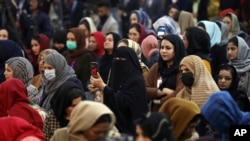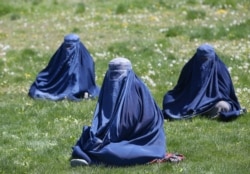A newly declassified U.S. intelligence assessment warns that women in Afghanistan are likely to see their rights disappear should the Taliban come to power following the withdrawal of U.S. forces.
The two-page Sense of the Community Memorandum, released Tuesday by the U.S. National Intelligence Council, finds no reason to believe the Taliban have changed their views on women's rights despite some public statements to the contrary.
"The Taliban remains broadly consistent in its restrictive approach to women's rights and would roll back much of the past two decades' progress if the group regained national power," the assessment states.
"The Taliban has seen minimal leadership turnover, maintains inflexible negotiating positions, and enforces strict social constraints in areas that it already controls," it adds.
The findings echo fears expressed by a variety of officials and human rights groups and are likely to feed a growing anxiety among many Afghan women.
"Right now, all Afghan women are concerned, really concerned," a woman who identified herself as Mehbooha told VOA. "We wish the international community would do something about protecting us. We fear things will go back to the past."
Afghan officials such as Hosna Jalil, the deputy minister of women's affairs, are likewise bracing for potential setbacks.
"We will continue to resist until the last minute," she told VOA's Afghan service last month.
U.S. officials, in the meantime, have repeatedly expressed hope that the Taliban will moderate their approach in exchange for international recognition and financial support.
"Those things will be all affected by how they treat their own citizens, first and foremost the women of Afghanistan, children and minorities," the U.S. Special Representative for Afghanistan Reconciliation Zalmay Khalilzad told lawmakers last week.
The just-released U.S. intelligence assessment, however, is skeptical.
"Some Taliban officials publicly say that the group will respect women's rights, but they caveat that these protections must align with Taliban interpretations of Sharia," it says.
The analysts also caution that even during the latest round of peace talks, starting almost two years ago, Taliban officials have spoken out against Western clothing for women and have "accused women's rights advocates of promoting immorality, indecency, and non-Islamic culture."
Still, the assessment warns that women's rights in Afghanistan are likely to face setbacks even without the Taliban finding ways to force their views on Afghan society.
"After decades of intensive international focus and funding, Afghanistan still ranks at or near the bottom of multiple U.N. (United Nations) and other global indices of conditions for women," the assessment notes.
"In some rural Pashtun areas, tribal codes that predate the Taliban require women's full-body covering or seclusion in their homes as a means of protecting their perceived virtue and their families' honor," the intelligence memorandum says. "Nationwide, child marriage and stoning for adultery persist, and rape victims are killed by relatives for shaming their families."
The U.S. assessment also points out that of the approximately 9 million Afghan children enrolled in school, only about 3.5 million are girls, and that less than half of all girls attend secondary school.
U.S. Democratic Senator Jeanne Shaheen, who has been vocal about the potential setbacks facing Afghan women, on Tuesday praised women members of Afghanistan’s parliament following a virtual meeting.
“[The] women engaged in the political and civil discourse around the rights of Afghan women and girls are so brave. But they shouldn’t have to be,” Shaheen said in a statement. “We cannot afford the hard-fought gains for women and minority populations to be lost.”
U.S. President Joe Biden has pledged to continue support for women’s rights in Afghanistan after troops leave.
Ayesha Tanzeem in Kabul and Cindy Saine in Washington contributed to this report.












